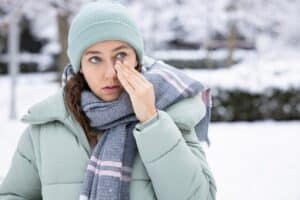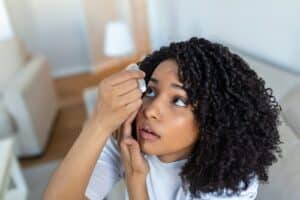Do your eyes feel dry, itchy, or watery? The time of year may have something to do with these symptoms.
When it’s cold, especially in the winter, the air is drier, which may affect your body. Your skin can feel more dehydrated.
You may also start noticing that your lips become chapped or cracked. But you may not realize that the dry air can also dry out your eyes.
If you have dry eyes, it may be because of the weather. But dry eyes can also be chronic. If you have dry eye syndrome, your eyes may feel drier and lack hydration due to colder weather.
Whether your dry eyes are temporary or due to dry eye syndrome, you can get the relief you need from uncomfortable symptoms. First, you need to recognize when you have dry eyes.
Next, you can try to treat those symptoms by making small changes in your life. But if those changes don’t give you significant relief, you should seek professional treatment as you may have dry eye syndrome. Keep reading to learn how to control your dry eyes this season!
Dry Eye Symptoms
If you have dry eyes, it often develops due to a problem with tear production. You either aren’t producing enough tears or the tears made are low in quality and can’t nourish your eyes.
Your tears are composed of three layers. The inner layer is mucus, the middle layer is water, and the outer protective layer is oil.
When your body isn’t producing enough of any one component, your eyes won’t get enough moisture. But what does it feel like to have dry eyes? These are the most common symptoms if you’re suffering from dry eyes:

- Burning sensation
- Stinging
- A feeling of grit in the eyes
- Light sensitivity
- Excess tearing and mucus
- Redness
If you experience these symptoms, you may be experiencing temporary dry eyes due to environmental factors. But you may also have dry eye syndrome.
The best way to start treating both conditions is through simple lifestyle changes.
Home Remedies
You can do several things to help ease your dry eye symptoms without professional treatment. Try these for relief:
Drink More Water

Dehydration can cause many health issues, including dry eyes. It’s harder to remember to drink enough water when it’s cold out.
It’s not uncommon for people to be more dehydrated in the winter. Make an effort to drink more water and electrolyte-rich beverages. If drinking water feels like a lot, you can also get hydration from soups and tea.
Reduce Screen Time

When it’s cold outside, it becomes more common to spend time indoors using electronic devices. But too much computer time, TV time, or time on your phone can dry out your eyes.
Blue light emitted from electronic screens is harmful in large quantities and can give you headaches, fatigue, and dry eyes. Try to reduce your TV time, or at the very least, take regular breaks from the screen and remember to blink!
Be Aware of Your Environment

Cold air can dry out your eyes, so be sure not to spend too much time outside when it’s cold out. But you also need to be careful around heating sources.
When the heat is on, air blows out from the vents, and that air can dry out your eyes if you’re directly exposed to it. Make sure you don’t sleep or sit near an air vent for long periods.
You can also invest in a humidifier to help keep the air in your home or workplace from getting too dry. If your eyes feel dry, keep eye drops or artificial tears on hand to combat irritation when it strikes.
Get More Omega-3 Fatty Acids

Certain nutrients aid in tear production. The best nutrients for tear production are omega-3 fatty acids. You can find omega-3 fatty acids in fish, walnuts, and seeds.
You can also get omega-3 fatty acids through supplements like fish oil or flaxseed oil pills. Just remember that it’s always more efficient to get nutrients through food directly rather than with nutritional supplements!
Use Artificial Tears

For immediate relief from particularly severe dry eye symptoms, you can take over-the-counter lubricating eye drops, also called artificial tears. These eye drops will help temporarily moisturize your eyes, although they aren’t a permanent solution.
Professional Treatment
You may have dry eye syndrome if simple lifestyle changes and home remedies don’t relieve your symptoms. See an eye doctor for proper diagnosis and treatment.
At Traverse City Eye, we offer several treatments for dry eye syndrome and the underlying conditions that may cause it. Your eye doctor may recommend one or more of the following treatments:
Prescription Eye Drops
We can prescribe Restasis or Xiidra, both eye drops that reduce inflammation, a common cause of dry eye syndrome.
Prokera
Prokera is an amniotic membrane that’s placed between two lenses. You’ll have Prokera placed on your eye. You’ll wear the device for three to five days before removing it. The tissue helps reduce inflammation and rehydrates your eyes.
Tear Care
Tear Care is an in-office treatment for dry eye syndrome. It helps your meibomian glands, which produce the oil layer that coats your tears.
When your meibomian glands aren’t producing enough oil, your tears lack this layer and evaporate too quickly on the surface of your eye. Tear Care helps soften blocked meibomian glands through gentle heat and a special tool that allows your ophthalmologist to express the oil from the glands.
Biotissue AmnioGraft
This treatment is similar to Prokera in that it uses an amniotic membrane. With the Biotissue AmnioGraft, the membrane will be permanently grafted onto the eye.
The procedure is minimally invasive and only has a 2-3 week recovery period. It’s used specifically to treat conjunctivochalasis, which keeps your eye from holding tears.
The graft helps your eyes retain tears while keeping the surface of your eye moist to treat further dry eye symptoms.

Are you ready to take control of your dry eyes? Start by scheduling an appointment at Traverse City Eye in Traverse City, MI, now!
